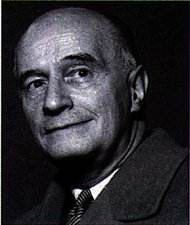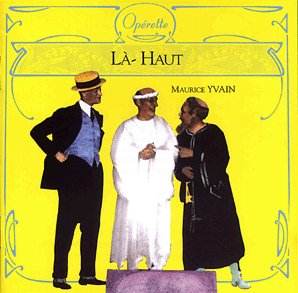
Maurice Yvain is largely unknown outside France, yet he followed
in the footsteps of Henri Christiné as a composer of Paris-based
musicals in the 1920s. He composed for the theatre between the
1920s and 1930s and with the advent of the ‘talkies’ wrote film
scores, which included La Belle Équipe (1936) and Lumières
de Paris (1938).
As a Parisian he would have been aware of the popularity of Christiné's
Phi-Phi in 1918 and like Christiné by then was already
a writer of popular song. His output encompassed revue numbers,
musical comedy and musical spectaculars. Before La-Haut,
Yvain had composed a successful operetta, Ta Bouche (1922),
that was translated to become One Kiss in London the following
year.
La-Haut is more exactly an opérette-bouffe which
is based on a dream sequence. The plot concerns a man who dreams
he is in heaven and returns in secrecy to visit his widow to discover
what she has been doing in his absence. As Traubner in his book,
Operetta, points out, it is a work full of high spirits
(literally), fun and fantasy that reflects some of the works by
Offenbach. The plot development is uneven and allots the majority
of vocal numbers to the men.
This 1953 recording was lucky to catch Maurice Chevalier before
his voice took on its later raspy characteristic. His rendering
of the show's hit fox-trot number, 'Le Premier Paradis, c'est
Paris' [CD1 tr.5] is both elegant and engaging. In fact this
and others were numbers Yvain tailored especially for Chevalier
so it is good we hear them as intended. The same cannot be said
for Roméo Carles: his comic role would be quite acceptable
on stage, but in a recording with no visual presence his coarse
and harsh voice is unattractive. It is a disappointment to find
that he sings in many of the tracks. Marina Hotine as Emma sings
with confident grace. Her innocent 'Etre veuve' {CD1 tr.8]
and sensuous 'Parce que' {CD1 tr.9] are a delight.
The mono recording is excellent and better than some made a decade
later. The orchestra responds well to Jacques-Henri Rys's engaging
pace. A spoken introduction of 1.05 minutes, as seems to be the
pattern on certain other discs in this series, seems unnecessary
as the information could be provided within the booklet.
Brief notes in French are provided and an attractive card case
replaces the usual jewel box.
Raymond Walker
Operette
series from Universal Accord reviewed
by Ray Walker

